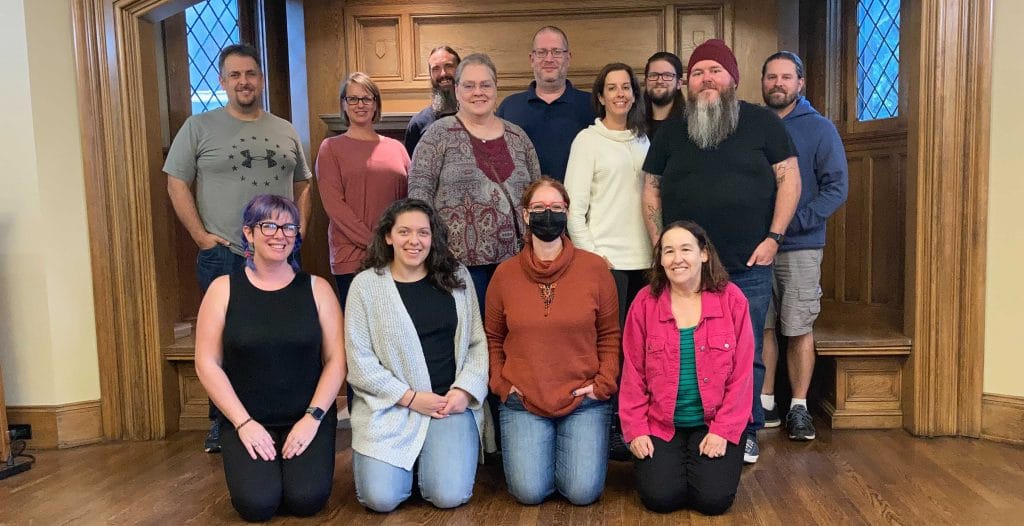A curated collection of the latest and most interesting podcast episodes about the author life.
Hello! Valerie Ihsan here today.
My podcast choices this week hint at my current mindset and upcoming projects. I’ve been working on my second memoir and have discovered there are a lot of scenes still missing. In Michelle Febos’s book, Body Work, she cautions against writing a story about your story. And that, I’m afraid, has happened for me this time around. I’ve told myself a personal narrative that I’m sharing on the page, but that personal narrative isn’t the whole story. It will require diving deeper into the not-so-pleasant parts about myself that I try to “blow off” in my everyday life. But writing requires honesty and authenticity, no matter the genre.
So, this week, I’ve got World-Building, Secrets, Marketing and Publicity, and Taxes for you. The whole gamut.
Enjoy. And keep the honesty in your writing. The Realer it is the Better it is.
Top 3 Must-Listen Episodes
Writer Craft Podcast // Ep60: Setting and World-Building
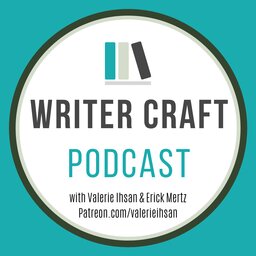
Erick and I have so much fun with this discussion. Here are a few highlights:
• Setting is part of world-building, but world-building encompasses a vast deal more. World-building=Story, World, and Character coming together.
• Parts of world-building include (but are not limited to): weather, culture, description of street/town/house/room, government, education, politics, social constructs.
• Sensory writing adds to setting, and arguably can’t be written without sensory details.
• If you don’t write fantasy, you STILL need to world-build.
• Martin Scorsese and Woody Allen both write New York, but they aren’t the same New York. Don’t make the mistake of assuming your reader is seeing the same New York/Chicago/Jackson Hole that you are writing about.
• If you worry about stereotyping, go down a few layers in your world-building. Let the reader see past the surface level of “Montana,” by naming streets and store names, and weather, yes, but then add the cultural world of the character. That takes more research. But being mindful of writing an actual representation of the way a person would react in this world. Ask yourself: what are the problems in this world? What makes it broken? Why is there conflict between the character and the world?
• If you write with authenticity, a character’s individual reaction to his surroundings/setting/world make it NOT stereotypical.
• How do you world-build in a series vs. a standalone novel? The first Act of each book in a series has to be varied, to build a DIFFERENT part of the world for the reader.
• How do you know if you are writing too much setting? Introduce a place the first time, but then you don’t need to bring it up again, unless there is a shattering moment in the world, and the reader needs to look at it again. (Because it has changed.)
• Don’t describe setting in a fast-paced scene (like running from the bad guy). But in moments of trauma where everything stops for a character, micro down to what is immediate to the character—right in front of their face. That’s authentic.
• What is different about world-building for a fantastical story/audience, and for a contemporary one? Establish baseline first. (Without info-dumping.) No matter the genre. Readers demand an elevation of setting for the fantastical setting. Something is going to shatter the stasis.
• How do you introduce a new world for the reader without info-dumping? (Example: What if Harry Potter stories were told by Hagrid’s POV?) The character reacts to a shattering moment in the real world and forces them to become a new person in a new world. For instance, a break-up happens and now the character is exploring life as a single person.
Write Away Podcast // Ep 86: How do you layer secrets to create depth in your story?
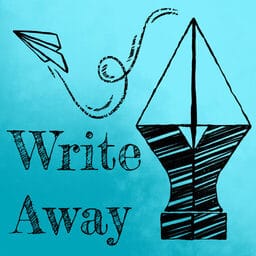
The High Priestess card lead their question this week. (Meaning: Inner voice, subconscious, and intuition. Reversed: repression, silence, secrets. For writing: internal knowledge, intuition, barrier between what you know about self and what is true.)
To write layered secrets in your manuscript, put just enough a secret in that creates a mild curiosity for the reader, but not enough information that causes frustration in the reader if it never gets answered. (Resources: Dark Matter (TV show); Six Wakes by Mur Laferty—uses amnesia as a tool in a good way.) (Invisible Sun, a role-playing game that masters secrets in the story.)
Crys and JP talk about the lies we tell others and the lies we tell ourselves, and how to use that in our work. Also, that there are world-building secrets and personal secrets.
Other questions we can ask ourselves as we write:
• What can you Not Say without Lying?
• What is the secret that my character is holding?
• What secret would most devastate the other character, and would cause chaos if they found out?
• What doesn’t the reader understand yet?
Write-Minded Podcast // Tough-Love Marketing, featuring M.J. Rose
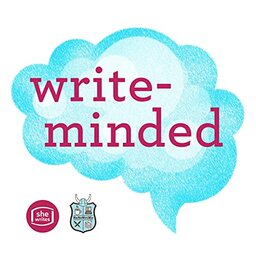
This was a great podcast episode. If you only listen to one this week, let this one be it. M.J. and the hosts of Write-Minded Podcast identify the differences between publicity and marketing. It was eye-opening.
This was definitely a tough-love episode and one that all authors, whether indie or traditionally published need to hear. “You need to be an optimist to write a book, but a pessimist to sell it.” What sells a book isn’t articles, TV spots, and interviews. All that does is get them go to Amazon and read the description and look at the book cover and read the reviews. And then they decide if it appeals to them. That’s what sells a book. Appeal. And all readers have a different idea of what appeals to them.
There are over two million books published each year. AND books don’t “die” anymore. (People are still discovering Agatha Christie—selling hundreds of thousands of copies a year.)
Hiring a publicist often leads to disappointment. ($7500-3000)
So, spend more $ on marketing rather than publicity. Every $ spent will show up in an ad. But you can hire a PR person, who hands the job to an intern, and get four blog posts—with no recourse.
• FB ads, Goodreads ads, Bookbub ads = best places to spend $
• Never Amazon Sponsored ads for Fiction. Non-fiction, okay.
• Never borrow money for PR and marketing. It’s hard to sell a book and you can’t hope your way into success.
(Anti)Strategy for unknown author for discovery: Don’t put your energy, heart, and soul into time spent on your own social media. Less than 1% of readers found the book from the author’s own social media account.
And there is no one way to discoverability. So, do as much of as many things as you can.
• Reach out to every single person you know, and to the libraries.
• Pre-order giveaway?
• Find something crazy about your book and find a bigmouth that will talk about it.
• Goodreads Giveaways: use the more expensive one because they email the non-winners.
Amazon reviews: 15-20 gets you street cred. If you buy an ad without those reviews, the reader that clicks on the ad won’t feel comfortable enough to buy. Next benchmark is a secret number that will trigger certain algorithms that create internal marketing. Somewhere over 50.
Campaign with lower price to get in top ten of a category; there will be algorithms that will kick off to a Top Ten, Top 100 of X Category that readers enjoy browsing. There is an aftereffect that keeps the book on the list even after the ad campaign lasts.
The Latest from The Author Life Podcast
55: WHAT IS YOUR EXPERIENCE WITH AUDIO?
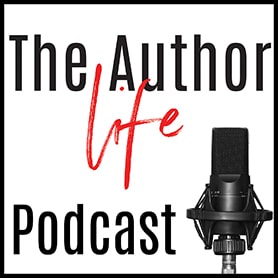
This week authors J. Thorn and Crys Cain discuss their experience with all things audio-related. From self-narrating to sourcing narrators, detailing the steps of publishing to deciding whether to publish, they cover it all.
The Wildcard: Interesting Episode from a Non-Writing Related Show
His and Her Money Podcast // How to Legally and Ethically Pay Less Taxes Michel Valbrun and Sheneya Wilson
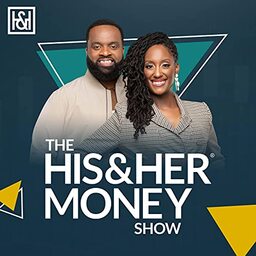
It’s tax season! Stop tipping the government. This episode breaks down strategies to keep as much as your money as you can, and how to do it legally and ethically. There are tips for the entrepreneur, but ALSO for the people that work a day job. People talk about savings, and investing, but what about how to be strategic with their taxes? This is a great episode that will spark a lot of ideas for you—whether you are a business owner, or not.
First thing: you are rewarded for benefiting yourself. So,
• Maximize your 401 K
• Deduct student loans and childcare
• Consider charitable giving
• Look into a self-directed IRA
• Remember MITCH: medical exp, interest pd, taxes pd, charitable donations, housing.
• Biz exp: office in house, materials for teachings, miles for driving to teaching locations, etc.
• Use the itemized deduction instead of the standard. There is no cap on itemized deductions.
• Diversify your income so that you are eligible for using other pieces of the tax code.
• 15.3% self-employment tax if you are a sole proprietor. If you make more than $50K/year, switch to an S-Corp. Less tax payments are required for S-Corps.
• In order to be a tax-free expense (IRS requirements): expense needs to be for your trade, business, or profession; it needs to be considered regular for your business; it needs to be considered essential; it needs to be economical.* (*The IRS bases this on your income. If you only made $10K from your business, and you buy a company car for $80K, the IRS won’t think that is economical and may perform an audit.)
• Rules for write-offs: it needs to be ordinary and necessary. Accountants can’t write off a horse, but can for a laptop and phones. Write-offs aren’t all treated the same. If you buy an asset, like a car, Section 179 of tax code talks about depreciation. If you are writing the value of it off all at once, it needs to weigh more than 6000 pounds, listed on your business, and is in service to your business. This doesn’t mean you can’t write off a vehicle that weighs less than 6000 pounds, there is just different rules for it. Maybe you could only expense your lease payments, or your gas, or your mileage. And then depreciate it over several years.
There was SO MUCH more to this episode. It really is worth listening to … since taxes are on the minds of many right now.
Inside The Author Life
And now I have to go work on my taxes…

Get the APB delivered straight to your inbox!
Need some help with your story?
Three Story Method certified editors are standing by, ready to help you become a better writer. Click on our picture or visit https://theauthorlife.com/editing/ for more details!
Posted in Author Podcast Broadcast

